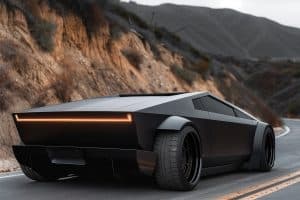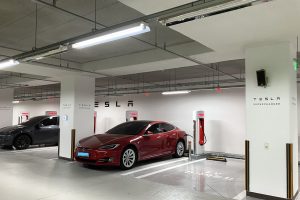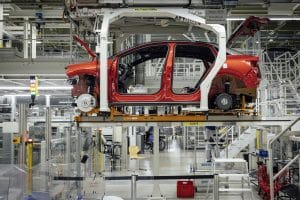- 🚗 Toyota’s Evolution: Toyota, once aligned with Tesla for electric RAV4 batteries, now distances itself from an all-electric future.
- 🤷♂️ Doubts and Accusations: Toyota faced skepticism and accusations of lobbying against EV legislation, challenging its commitment to electric vehicles.
- 🌐 Multi-Pathway Strategy: Toyota claims a diverse approach, releasing hybrids, plug-in hybrids, hydrogen fuel cell vehicles, and electric cars, challenging the industry’s all-electric trend.
- 🗣️ Toyota’s Defense: Sean Hanley, Toyota Australia’s VP, insists the company isn’t anti-EV, expressing excitement about entering the BEV market but sees it as part of a broader strategy.
- 📈 Market Dynamics: Hanley emphasizes responding to consumer demand, citing diesel-powered utes’ sales success in 2023 and highlighting the market’s influence on the industry.
- 🌍 Community Responsibility: Toyota positions its strategy as a social responsibility, arguing for bringing vehicles with capabilities matching consumer preferences while reducing carbon footprint.
- 📣 Realism vs. Perception: Toyota defends its stance as being real and honest about its position, challenging perceptions of anti-BEV sentiment.
- 🚙 Consumer Demand Influence: Toyota believes the market, not car companies, determines reality, pointing to consumer preferences for diesel-powered vehicles.
- ⚡ Excitement for BEV Market: While embracing the BEV market, Toyota sees it as part of a multi-pathway strategy, downplaying it as the sole solution for carbon neutrality.
- 🌐 Global EV Trends: Hanley’s comments contrast with the global trend where premium all-electric cars like the Tesla Model Y dominate sales, raising questions about Toyota’s approach.
In a surprising turn of events, Toyota, once synonymous with innovation and electric collaboration with Tesla, finds itself at the crossroads of the electric vehicle (EV) revolution. The Japanese automotive giant, now under scrutiny and labeled “anti-EV,” stands firm, defending its stance as a realist in the ever-evolving automotive landscape.
Toyota’s Evolution in the EV Era
Toyota’s journey in the EV realm began with a partnership with Tesla in 2012 for electric RAV4 batteries. Fast forward to the present, and the company has taken a divergent path, expressing doubts about a complete transition to all-electric vehicles. The skepticism surrounding Toyota’s commitment to EVs intensified with accusations of lobbying against pro-EV legislation.
A Multi-Pathway Strategy: Beyond All-Electric
Amid the industry’s trend towards an all-electric future, Toyota asserts its commitment to a multi-pathway strategy. This includes the release of hybrids, plug-in hybrids, hydrogen fuel cell vehicles, and electric cars, challenging the predominant narrative of a singular EV trajectory.
Toyota’s Defense: Realism Over Perceived Opposition
Sean Hanley, Toyota Australia’s VP of Sales and Marketing, steps forward to clarify Toyota’s position. He vehemently denies the “anti-EV” label, expressing excitement about Toyota’s entry into the Battery Electric Vehicle (BEV) market. However, he emphasizes that this move is part of a broader strategy, not a pivot towards exclusive reliance on electric power.
Market Dynamics: Responding to Consumer Demand
Hanley underscores the importance of market dynamics in shaping Toyota’s strategy. Referring to the company’s 2023 sales data, he highlights the popularity of diesel-powered utes, emphasizing the market’s influence on the industry. Toyota sees its role as responding to consumer demand for vehicles that align with their preferences.
Social Responsibility: Balancing Capability and Carbon Footprint
Toyota frames its strategy as a social and community responsibility. The company contends that until alternatives match the capabilities of diesel-powered vehicles, it has an obligation to supply market demands while addressing environmental concerns. This nuanced approach aims to balance consumer desires with a reduced carbon footprint.
Realism vs. Perception: Challenging Misconceptions
Defending its position, Toyota challenges the perception of being anti-BEV. Hanley underscores the importance of honesty with the market, positioning Toyota as a realist navigating the complexities of the automotive landscape.
Global EV Trends: Toyota’s Approach in Question
Hanley’s statements, however, stand in contrast to the global trend where all-electric vehicles, exemplified by the Tesla Model Y, have achieved remarkable success. Questions arise about Toyota’s approach as the industry undergoes a transformative shift towards sustainable and electrified transportation.
In conclusion, Toyota’s journey reflects the complexities of an industry in transition. While the company emphasizes a diversified strategy, the global move towards all-electric dominance raises questions about the adaptability and future positioning of one of the automotive giants.





